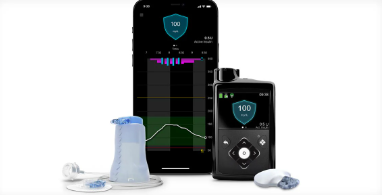
image credits: Medtronic Diabetes
Medtronic presented a comprehensive body of new data at the American Diabetes Association's (ADA) that showcases the benefits of their new MiniMed 780G system. New data demonstrates how the system addresses hyperglycemia and nighttime burden, adding to the system's ability to tackle other challenges of diabetes, such as managing highs and meal-time management or carb counting, while also mirroring outcomes across a wide-ranging patient population.
A new retrospective analysis of real-world data showed that the morning peak in blood glucose – called the Dawn Phenomenon - was nearly eliminated for users who upgraded from the MiniMed 770G system to the MiniMed 780G system. The transition from the MiniMed 770G system to the MiniMed 780G system decreased dawn phenomenon rates from 12.2% to 4.5%. Time in Range also increased from 87.7% to 91.4% from 12 – 6 a.m., which is consistent with dawn phenomenon trends.
For individuals living with type 1 diabetes, CGM-generated alerts and the need to deliver manual boluses disrupt sleeping through the night adding to the burden of diabetes. The MiniMed 780G system is designed to reduce the burden of diabetes throughout the day and night. Additional real-world data from a retrospective analysis (from 8019 participant; <7 y/o, previously on the MiniMed 770G system) demonstrated that users had fewer overnight sleep interruptions and Time in Range improvements as a result of the automatic adjustments in insulin and correction of glucose levels every 5 minutes, including during sleep. With the MiniMed 780G system, nighttime alerts decreased 45% for all users and 55% for those who used recommended optimal settings. Additionally, uninterrupted sleep, a greatly desired outcome for those living with diabetes, increased by 30 and 36 minutes per night, respectively. These results add to the diabetes burden reduction that MiniMed 780G system users experience with an advanced algorithm with frequent, every 5-minute autocorrections.
Along with evidence on the currently available MiniMed 780G system, additional data will be presented on the next iteration of the system, which aims to further reduce diabetes management burden through its design. The system is intended to be paired with the Simplera Sync sensor, a disposable, all-in-one continuous glucose monitor (CGM) designed to require no overtape.
A 24-site, single arm study evaluated the use of the next iteration of the MiniMed 780G system algorithm paired with the Simplera Sync sensor. Results were promising across all clinical outcomes metrics.
The MiniMed 780G system is currently available for ages 7 and above in over 100 countries globally and will be launching with the Simplera Sync sensor in parts of Europe in late July. Currently, Simplera Sync is investigational and not approved for commercial use in the U.S.